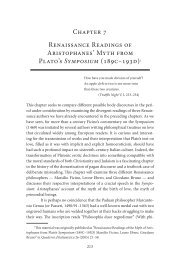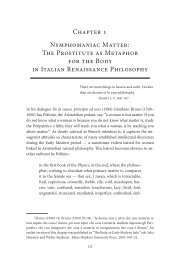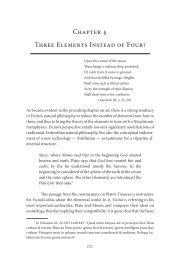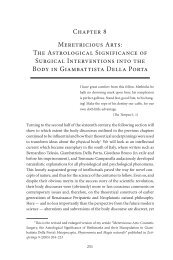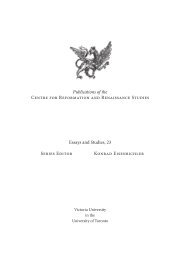Chapter 2 Matter as a Mirror: Marsilio Ficino and Renaissance ...
Chapter 2 Matter as a Mirror: Marsilio Ficino and Renaissance ...
Chapter 2 Matter as a Mirror: Marsilio Ficino and Renaissance ...
Create successful ePaper yourself
Turn your PDF publications into a flip-book with our unique Google optimized e-Paper software.
<strong>Matter</strong> <strong>as</strong> a <strong>Mirror</strong> 61<br />
others when she goes forth into some one individual thing;<br />
but, while she preserves all she goes forth into individuals.<br />
Justly we are entitled to call her, therefore, the centre of<br />
nature, the universal mean, the chain or succession of the<br />
world, the face of all, the knot <strong>and</strong> bond of the universe. 49<br />
In this c<strong>as</strong>e, soul not only functions <strong>as</strong> the mediating agency in the<br />
centre of creation, but may even be said to produce lower things. For the<br />
lowest manifestation of form, the qualities, the contact with the material<br />
world h<strong>as</strong> dis<strong>as</strong>trous consequences: matter, which is in itself motionless <strong>and</strong><br />
entirely p<strong>as</strong>sive, is moved by the qualities. Once they become immersed into<br />
the corporeal world, the qualities lose in power <strong>and</strong> become the potentially<br />
inefficient tools of the soul. 50<br />
<strong>Ficino</strong> says that these “instruments of the soul” become crippled<br />
<strong>as</strong> they get immersed in matter, plunged <strong>as</strong> they are like the souls of the<br />
dece<strong>as</strong>ed into the river Lethe. By extension, matter dilutes the powers of the<br />
concentrated principles. 51 That embodied qualities become “lame” points<br />
49 Trans. Allen (1987) 399; Theologia III, 2: I, 141–142: “Reliqua enim sub Deo unum<br />
quidam in se singula sunt, haec omnia simul. Imagines in se possidet divinorum, a quibus<br />
ipsa dependet inferiorum rationes et exemplaria, quae quodammodo et ipsa producit. Et<br />
cum media omnium sit, Vires possidet omnium. [Quod] si ita est, transit in omnia. Et quia<br />
ipsa vera est universorum connexio, dum in alia migrat, non deserit alia, sed migrat in<br />
singula, ac semper cuncta conservat, ut merito dici possit centrum naturae, universorum<br />
medium, mundi series, vultus omnium nodusque et copula mundi.” On soul producing<br />
bodies, see Theologia VI, 1: I, 271.<br />
50 Collins (1974) 21: “Each level in the hierarchy of the universe is related to its superior<br />
<strong>as</strong> moved to mover; thus , each level is superior in efficacious power to the one below<br />
it. The hierarchy of the universe consists of various grades of power, <strong>and</strong> power is identified<br />
with unity. This framework within which <strong>Ficino</strong>’s whole discussion proceeds is taken<br />
from Proclus. Also, <strong>Ficino</strong> insists that efficacious power belongs only to the incorporeal;<br />
the corporeal is completely impotent because of its divisibility. He argues that quality is<br />
perishable because it is divided in the body <strong>and</strong> because it belongs to a substance by which<br />
it cannot be ab<strong>and</strong>oned. He places the soul between mind which is completely stable <strong>and</strong><br />
quality which is completely unstable, <strong>and</strong> concludes that the soul is stable, but mobile in<br />
operation. These themes are to be found in Proclus’ Elements of Theology.”<br />
51 Theologia I, 3: I, 51: “Qualit<strong>as</strong> autem est proxima quantitati. Itaque non est omnino<br />
sufficiens qualit<strong>as</strong> ad extrinsecam actionem. Si ergo claudicat ad agendum, a substantia<br />
superiore dirigitur, quae omnino sit potens. Merito qualit<strong>as</strong> claudicat, quoniam<br />
eo ipso momento quo n<strong>as</strong>citur spargitur per materiae latitudinem profunditatinemque,<br />
et qu<strong>as</strong>i Letho flumine mergitur. Quo fit ut, antequam ipsa agat quicquam, a materia



